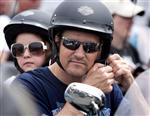 A service of the U.S. National Library of Medicine
A service of the U.S. National Library of Medicine  National Institutes of Health
National Institutes of Health

Helmets protect motorcyclists' faces, too
(*this news item will not be available after 10/16/2012) Wednesday, July 18, 2012
By Genevra Pittman
NEW YORK (Reuters Health) - Want to hold on to that pretty face of yours? Better strap on a helmet the next time you're out on the open road.
According to a new study of motorcycle collisions, bikers were less than half as likely to break a nose or dent a jaw when they were wearing protection.
"The number of motorcycles on the road and the number of collisions in the last several years has just risen precipitously," said Dr. Joseph Crompton, a surgeon from the University of California, Los Angeles who led the new study.
There's an ongoing debate about whether state governments should require bikers to wear helmets, he added. And the number of states with those laws has decreased in the last few decades, due to lobbying from the motorcycle community.
"I think it certainly supports the idea that there should be mandatory helmet laws," Crompton, who rides a motorcycle, told Reuters Health.
For the new study, he and his colleagues consulted information from the National Trauma Data Bank, including records of more than 46,000 bikers sent to U.S. hospitals after a collision in 2002 through 2005.
Seventy-seven percent of bikers were wearing helmets at the time of the crash. And that proved to be a face-saving decision, according to findings published in the Archives of Surgery.
In total, about 1,700 bikers suffered nose injuries, 2,300 had eye injuries and 800 busted their jawbones. Another 1,400 had face bruises from the collision.
But helmeted bikers were less likely to come away with each of those injuries, and had a 60-percent lower chance of suffering any serious face-related harm compared to helmet-free riders, the researchers reported Monday in the Archives of Surgery.
Crompton said it's been well documented that wearing a helmet protects motorcyclists against traumatic head injuries and death in the event of a crash. Now, he noted, there's conclusive data showing facial injuries can be added to that list.
The researchers didn't have information on the type of helmets bikers were wearing, so they couldn't tell if having a face shield, for example, affected the risk of injury.
Dr. Peter Layde, co-director of the Injury Research Center at the Medical College of Wisconsin in Milwaukee, said face shields likely play some role in preventing injury, but helmets can also absorb blows to the side of the head and prevent fractures there from extending to the face.
According to the Insurance Institute for Highway Safety, 19 states and Washington, D.C. have laws requiring all motorcyclists wear a helmet. Another 28 states only require some bikers - such as those under 21 or under 18 - to wear a helmet, and Illinois, Iowa and New Hampshire have no motorcycle helmet laws.
"That probably flies in the face of really compelling evidence that many lives could be saved if motorcycle helmets would be required," said Layde, who wasn't involved in the new study. "Also, there'd be a really substantial decrease in healthcare costs."
"I don't think anyone really argues with the logic that if you wear a helmet, you're going to have fewer facial injuries," said Dr. Terence O'Keeffe, a surgeon from the University of Arizona Medical Center in Tucson, who has studied motorcycle accidents and injuries.
"When I see people in the (emergency room), I can usually tell immediately what kind of bike they were on and if they were wearing their helmet or not," O'Keeffe, who also didn't take part in the new research, told Reuters Health.
"There's not a single study that suggests motorcycle helmets are a bad thing when it comes to motorcyclists."
But O'Keeffe said the anti-helmet motorcycle lobby, and its power to bring money and tourism to or from a state, has dwarfed the science.
"I think the bigger issues are, how do we truly persuade legislatures to decide it's worth having a motorcycle helmet law?"
SOURCE: http://bit.ly/NwfyDm Archives of Surgery, online July 16, 2012.
- More Health News on:
- Motor Vehicle Safety